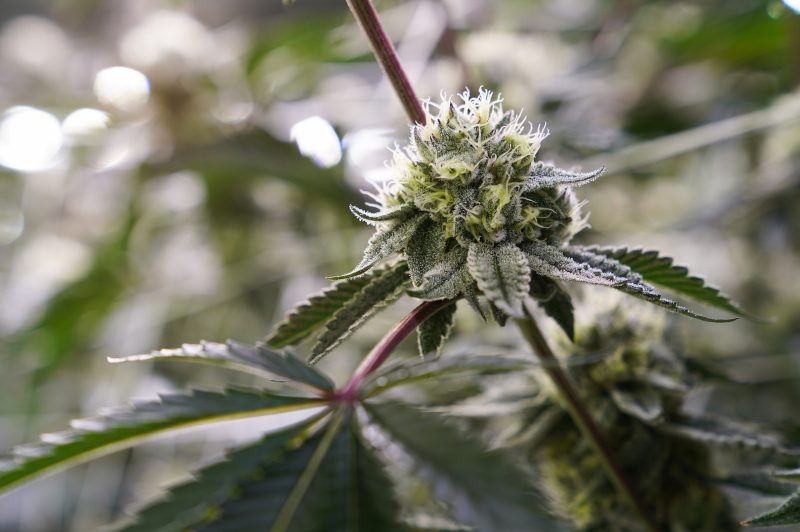Recreational marijuana’s strong victory in red-state Ohio last week means legalized cannabis will soon be available to more than half the U.S. population. But current and potential federal employees and contractors are not allowed to indulge, no matter where they live.
Despite the steady legalization among states since 2012 and a Gallup poll released this month showing approval from a record 70 percent of Americans, marijuana possession remains a federal crime and a major impediment to federal employment. There is hope, however, for those who use cannabis for medical reasons or just to get high.
The outside-the-Beltway developments have drawn increased attention to little-noticed, bipartisan congressional legislation approved with a 30-14 vote in September by the House Committee on Oversight and Accountability. The Cannabis Users Restoration of Eligibility (CURE) Act would prohibit federal employers from using prior — but not current — marijuana consumption as grounds for blocking federal employment or security clearances. Democrats were unanimous in their support, while Republicans split, with 14 voting no and 10 voting yes.
While there’s no guarantee that the quickly increasing public support for legalized cannabis will result in quick CURE action by Congress, “there is certainly more justification for it being fast-tracked now that there are millions more potential federal job applicants who could be disqualified from gainful employment in the civil service for behavior that will be lawful very soon,” said Morgan Fox, political director of NORML, the National Organization for the Reform of Marijuana Laws. “Lawmakers generally have been taking notice and being more vocal about their support for incremental and comprehensive reforms.”
Diane Goldstein, executive director of the Law Enforcement Action Partnership, urged members of Congress to heed the “resounding rejection of our nation’s long history of criminalization,” and “align with their constituents by promptly passing the CURE Act, which will ensure the federal government no longer disqualifies promising candidates simply because of marijuana use.” LEAP, an organization of law enforcement professionals, advocates for criminal justice and drug policy reforms.
This is personal for one lawmaker, Rep. Nancy Mace (R-S.C.), a co-sponsor of the bill. She didn’t need the vote in Ohio or approval from other Republicans to push for easing restrictions against cannabis use. Unlike others at a meeting about the bill, Mace spoke about being raped at age 16 and using a prescribed antidepressant that “made me want to kill myself.”
Then she turned to marijuana. “Cannabis saved my life,” she added. “And anyone that was in the same position that I was should not be penalized for using something that has saved their life.”
Mace also quoted Harry Anslinger, the first director, in 1930, of the Federal Bureau of Narcotics, predecessor to the Drug Enforcement Administration. He used racism against “Negroes, Hispanics, Filipinos, and entertainers” to justify marijuana prohibition, according to a National Library of Medicine paper. “Their satanic music, jazz and swing, results from marijuana use,” Anslinger said. “This marijuana causes White women to seek sexual relations with Negroes, entertainers, and others.”
Added Mace, “I am not going to peddle in any future racism on that prohibition.”
Committee approval weakening that prohibition “moves the federal government toward recognizing the widely established legal use of medical and recreational cannabis,” said Rep. Jamie Raskin (D-Md.), co-sponsor of the legislation. “The CURE Act will ensure that talented individuals seeking to honorably serve our country are not precluded from doing so simply because they admit to having once used marijuana.”
The federal government already was moving in that direction, albeit slowly. A year ago, the Office of Personnel Management proposed a new “personnel vetting questionnaire” with “a more limited scope of questioning regarding past use of marijuana in comparison to other illegal drugs” to “improve the pool of applicants for federal employee and federal contractor positions.” A December 2021 memo from Avril Haines, the director of national intelligence, said use of “marijuana remains relevant, but not determinative” in access to classified information.
Bill opponent Rep. Pete Sessions (R-Texas) warned against “moving for the sake of expediency without proper consideration of whether there are national security risks in doing so.” His office did not reply to a request for specifics on how the bill and marijuana consumption might increase risks.
Rep. Clay Higgins (R-La.) said he opposed the bill until marijuana is reclassified as a less dangerous drug, something he favors and the Biden administration is considering. The former police officer promoted reclassification by saying he has arrested people under the influence of every dangerous substance imaginable “and I never had to fight a guy that was smoking a joint. Those guys are sitting on a couch, man, eating Oreos and watching cartoons.”
The committee accepted an amendment by the Republican chairman, Rep. James Comer, that limits the bill to prior cannabis consumption. Without that change, the bill would appear to accept behavior — using marijuana — that remains illegal under federal law, despite increasing acceptance by the states. That includes Kentucky, Comer’s home state, which he noted legalized medical marijuana this year.
“This legislation makes it clear to younger applicants what the rules of engagement are when it comes to prior drug use and eligibility for federal employment,” said Comer, who voted yes. “By removing this uncertainty and clarifying the process, we can help to attract … talented tech experts to the field of public service.”
Anthony Armour was a dedicated public servant with decades in law enforcement, including 16 with the DEA. While on duty in 2016, a traffic accident left him with continuous neck and back pain. Later, he found relief after using the cannabidiol (CBD) oil found in marijuana. The legislation would not have applied in his case, but it shows the difficulties feds face if they need medical marijuana.
CBD “is not impairing, meaning it does not cause a ‘high,’” says the Centers for Disease Control and Prevention. But CBD does produce a positive test for cannabis, and that led to Armour’s firing. He is fighting that in a federal court appeal filed Wednesday, after an independent administrative ruling upheld his 2020 termination. The 49-year-old Houston resident has been unable to find steady employment since then.
“It’s been difficult. It’s been really difficult financially,” said the married father of two. “It’s really frustrating to say the least. You know, I have a family to support.”




























